Paratrechina vividula
(Nylander)

 Iran list Iran list  Type location Finland
(Formica vividula, Nylander, 1846a: 900,
illustrated petioles, all forms), Helsinki hothouses - see below Type location Finland
(Formica vividula, Nylander, 1846a: 900,
illustrated petioles, all forms), Helsinki hothouses - see below
junior synonyms
picea (Formica picea n. sp., Buckley, 1866:
163, worker; synonym Mayr, 1876: 78;
Mayr, 1886d: 431) from USA, Austin, Texas - no images on Antweb
(October 2014)
kincaidi (Prenolepis kincaidi sp. nov.,
Wheeler, 1906e: 350,
illustrated male genitalia, all forms; synonymy Trager, 1984b: 75) from
Bermuda, coll. Kincaid - no images on Antweb
(October 2014)
subspecies
antillana (Prenolepis guatemalensis Forel
race antillana n. stirps, Forel, 1893g:
340, all forms; var of vividula, Forel, 1912i: 66)
from Antilles Is - no images on Antweb (October 2014)
australis (Paratrechina
(Nylanderia) vividula Nyl. v. australis
n. var., Santschi, 1929d:
313, worker) from Brazil, Paraná, Rio Negro - no images on
Antweb (October 2014)
docilis (Prenolepis
vividula Nyl. nov. subspec. docilis,
Forel, 1908c: 402, worker) from Brazil, Sao Paulo, v. Ihering -
no images on Antweb (October 2014)
mjobergi (Paratrechina
(Nylanderia) vividula Nyl. v. Mjobergi
n. var., Forel, 1908b: 64, worker) from Sweden, Stockholm
hothouses; see Emery
(1910a: 131) - see http://www.antweb.org/specimenImages.do?name=usnment00753566.
|
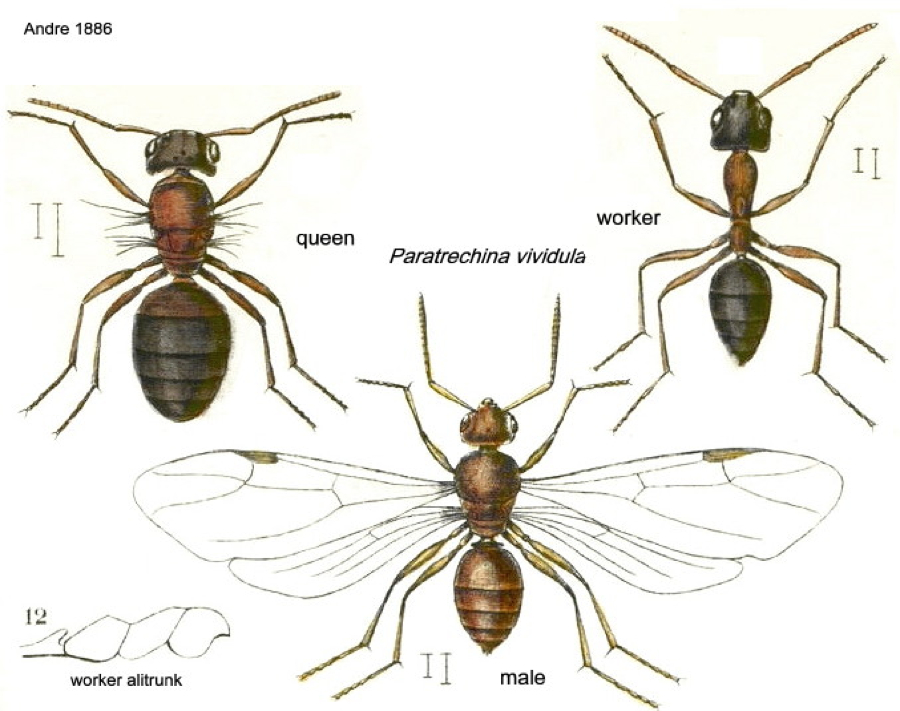 Nylander's
(1846a) description is at Nylander's
(1846a) description is at  .
Nylander (1856b) showed the antenna, in comparison with longicornis
(as gracilescens), this is at .
Nylander (1856b) showed the antenna, in comparison with longicornis
(as gracilescens), this is at  Buckley's (1866) description of picea is at
Buckley's (1866) description of picea is at  Forel's (1893g) description of antillana is at
Forel's (1893g) description of antillana is at  Wheeler's (1906e) description of kincaidi
is at Wheeler's (1906e) description of kincaidi
is at  Forel's (1908c) description of docilis
is at Forel's (1908c) description of docilis
is at  Emery (1910a: 130) gave an
illustrated
description, this is at Emery (1910a: 130) gave an
illustrated
description, this is at  Santschi's (1929d) description of australis is at
Santschi's (1929d) description of australis is at 
|
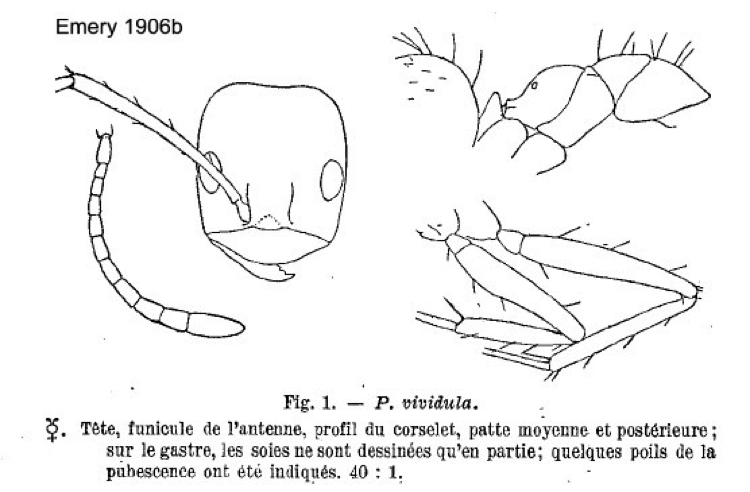 Note
- the original description by Nylander was of specimens from a colony
in hothouses in Helsinki, so the type location is mis-leading. Forel's
(1908b: 64) note on var mjobergi
has - "differs
from type by its flatter alitrunk (less convex), with the metanotal
groove a little more accentuated It is also a much darker brown,
chestnut on the head and gaster; from hothouses in Stockholm". Emery
(1910a) had the colour as red-gold to brown-gold, the gaster darker Note
- the original description by Nylander was of specimens from a colony
in hothouses in Helsinki, so the type location is mis-leading. Forel's
(1908b: 64) note on var mjobergi
has - "differs
from type by its flatter alitrunk (less convex), with the metanotal
groove a little more accentuated It is also a much darker brown,
chestnut on the head and gaster; from hothouses in Stockholm". Emery
(1910a) had the colour as red-gold to brown-gold, the gaster darker
Good
images of all stages can be seen at www.hormigas.org
[The queen shown on Paratrechina
natalensis is from South Africa
appears to match all the details of P. vividula
and extends the known distribution to that country and, thus,
sub-Saharan Africa. The locale, however, presumably, has a
Mediterranean type climate enabling a migrant species to become
established.
LaPolla, Hawkes & Fisher (2011) state that vividula can be separated from by
the number of erect hairs (they use macrosetae) on the antennal scape,
claiming that vividula
has less than 10 such erect hairs on each scape. As shown below,
that is not the case with workers from Egypt. In all other
details the Egypt specimens appear to match the vividula description. Lapolla et al., however, chose to
illustrate their paper with a vividula
specimen from the USA. The Egypt specimen quite clearly differs
from those I show of P.
jaegerskioleldi, and
that also are from Egypt, together with sexuals, of which the male
genitalia exactly match those they show (Figs 99 & 100).
Now (September 2015) I have workers from Iran (bottom)
which also show numerous erect hairs on the scapes.
|
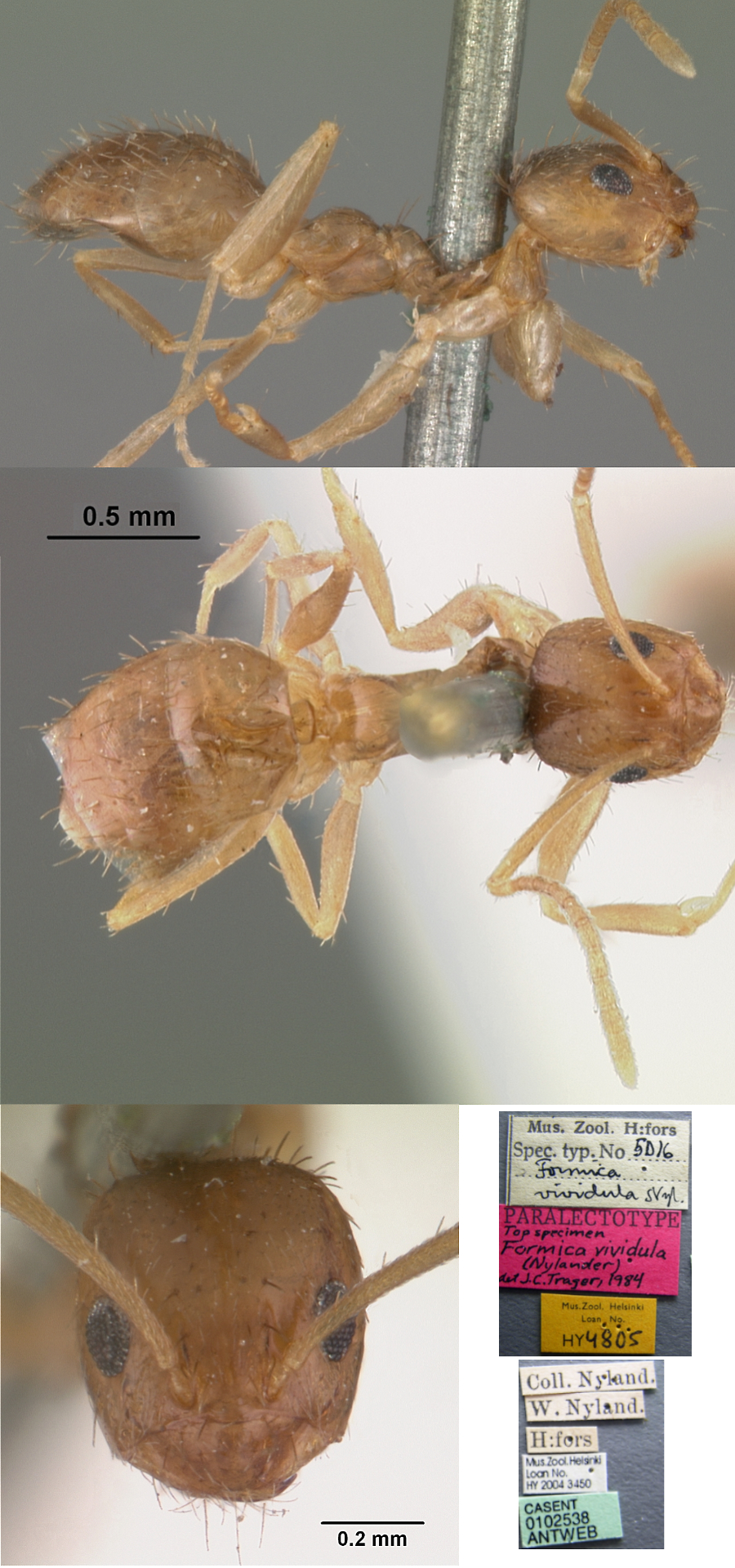 The
photomontage
of a paralectotype worker is collated from http://www.antweb.org/specimen.do?name=casent0102538 The
photomontage
of a paralectotype worker is collated from http://www.antweb.org/specimen.do?name=casent0102538
This specimen matches that I show (below) from Egypt.
|
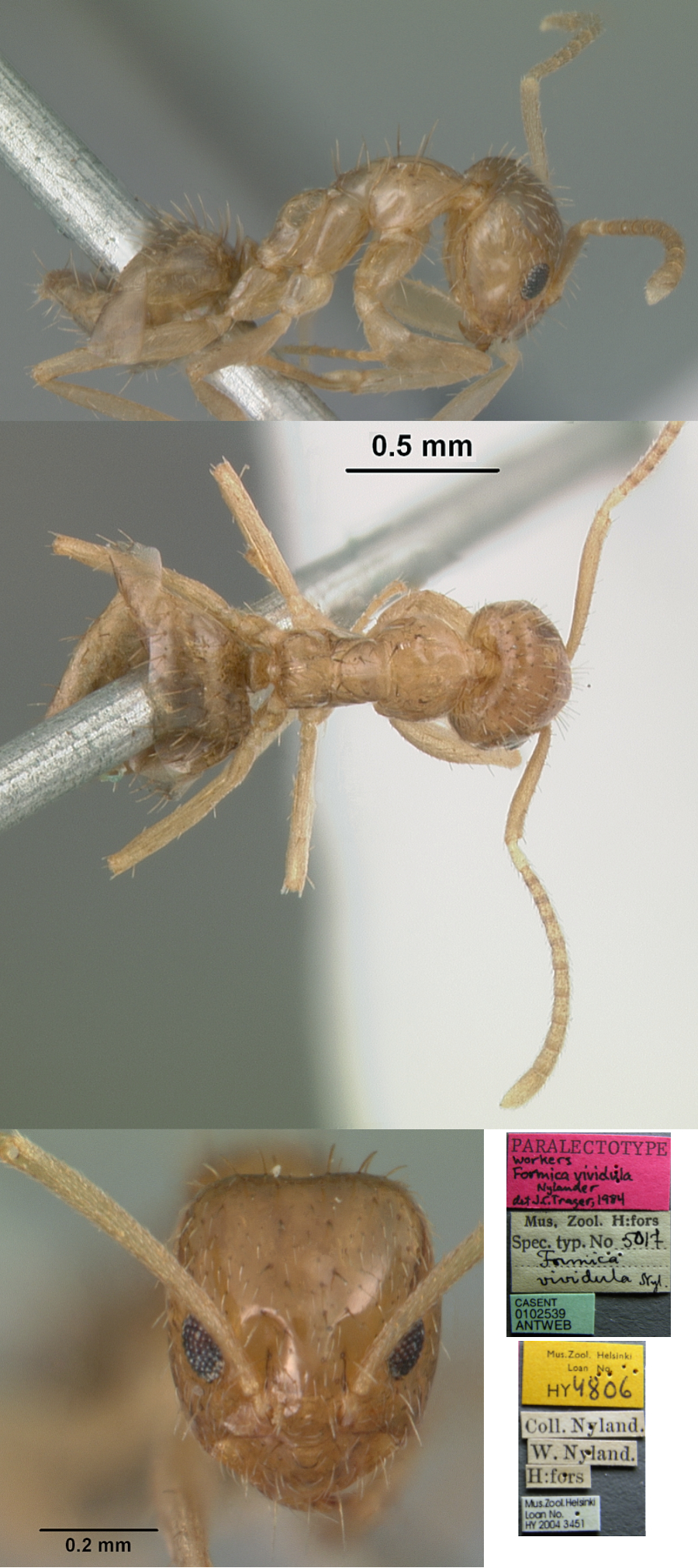 The
photomontage
of a smaller paralectotype worker is collated from http://www.antweb.org/specimen.do?name=casent0102539 The
photomontage
of a smaller paralectotype worker is collated from http://www.antweb.org/specimen.do?name=casent0102539
|
Oxford University
Museum
specimens
Paratrechina vividula
B Taylor det. |
Egypt
M Sharaf
|
26.viii.2003
Port Said
31°16' N
32°18' E
|
Hand collected
(three on one pin)
|
3
|
 |
Paratrechina vividula
B Taylor det. |
Iran
Torabi
19
|
28.vi.2014
29.62972°N
52.52677°E
1562 m
|
Azadi Park, Shiraz
hand collected
park, soil; 20:26 h
major & minor workers
|
2
|
 |
Paratrechina vividula
B Taylor det. |
Iran
Torabi
20
|
13.vi.2014
29.618265°N
52.57529
|
Baba Kouhi, Shiraz
hand collected
field, soil; 13:22 h
major & minor workers
|
2
|
 |
Paratrechina vividula
B Taylor det. |
Iran
Torabi
21
|
28.vi.2014
29.62972°N
52.52677°E
1562 m
|
Azadi Park, Shiraz
hand collected
park, soil
20:12 h; minor worker
|
1
|
 |
Paratrechina vividula
B Taylor det. |
Iran
V H Kia
24
|
14.v.2014
34.39°N
50.87°E
1442 m
|
Kokab Park, Qom
hand collected
park, on ground
1653h
|
1
|
 |
|
 Egypt records
- Paratrechina vividula - record
in André (1882b: 204) [andre-hns99999.pdf; plate x, figs
8-10 & 12]. Egypt records
- Paratrechina vividula - record
in André (1882b: 204) [andre-hns99999.pdf; plate x, figs
8-10 & 12].
Sharaf list - Material examined: Khniza (Nubaria),
21.ix.2002 (9); Zaranik (North Sinai), 5.v.2003 (12)(SHC).
The photomontage is of workers from Egypt, Port Said; collector
Mostafa
Sharaf.
|
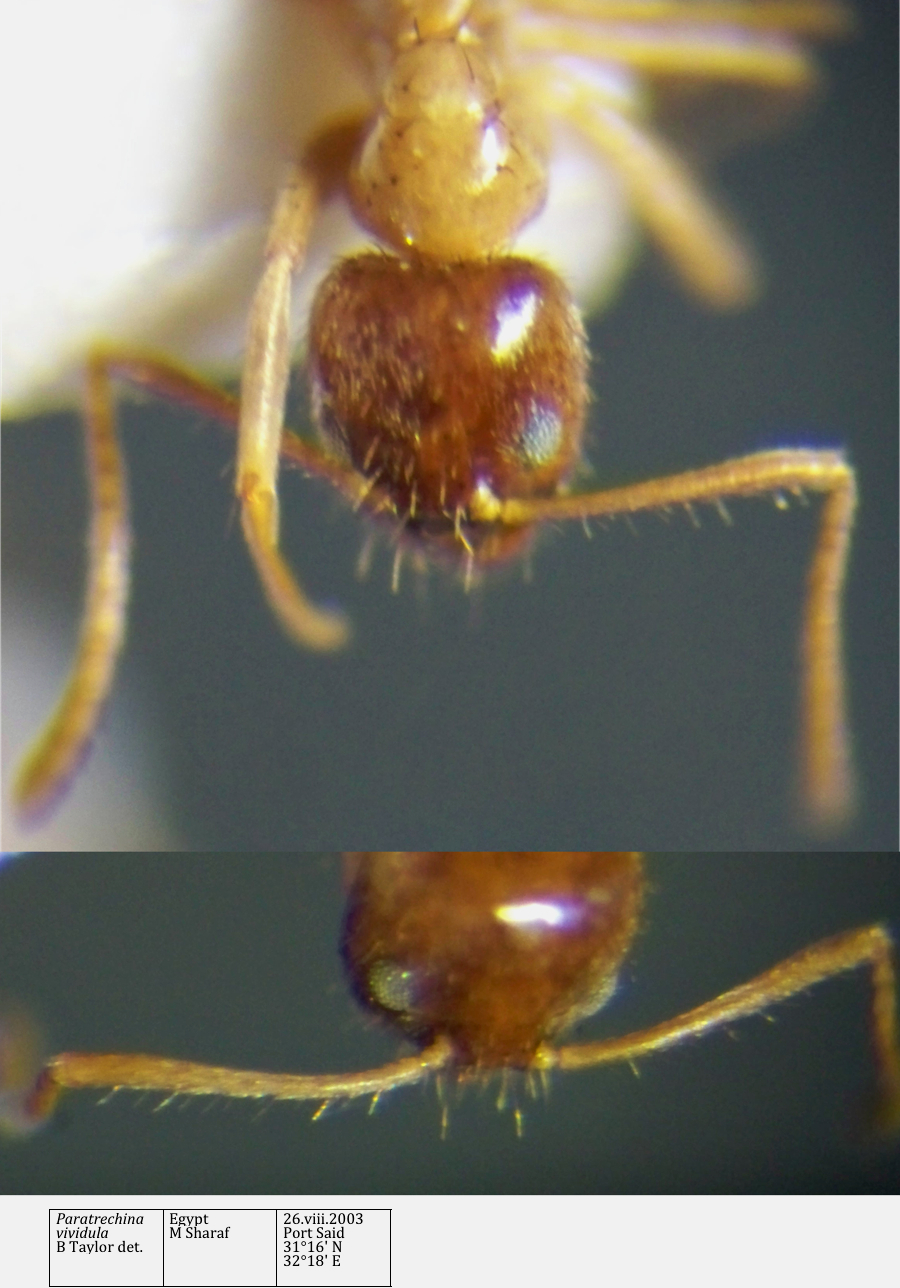 The photomontage is
of the scapes of two workers from Egypt, Port Said; collector
Mostafa Sharaf. The photomontage is
of the scapes of two workers from Egypt, Port Said; collector
Mostafa Sharaf.
|
 The photomontage is
of a major worker from Iran, Azadi Park, Shiraz; collector
Roshanak Torabi (19). The photomontage is
of a major worker from Iran, Azadi Park, Shiraz; collector
Roshanak Torabi (19).
|
 The photomontage is
of a minor worker from Iran, Azadi Park, Shiraz; collector
Roshanak Torabi (19). The photomontage is
of a minor worker from Iran, Azadi Park, Shiraz; collector
Roshanak Torabi (19).
|
|